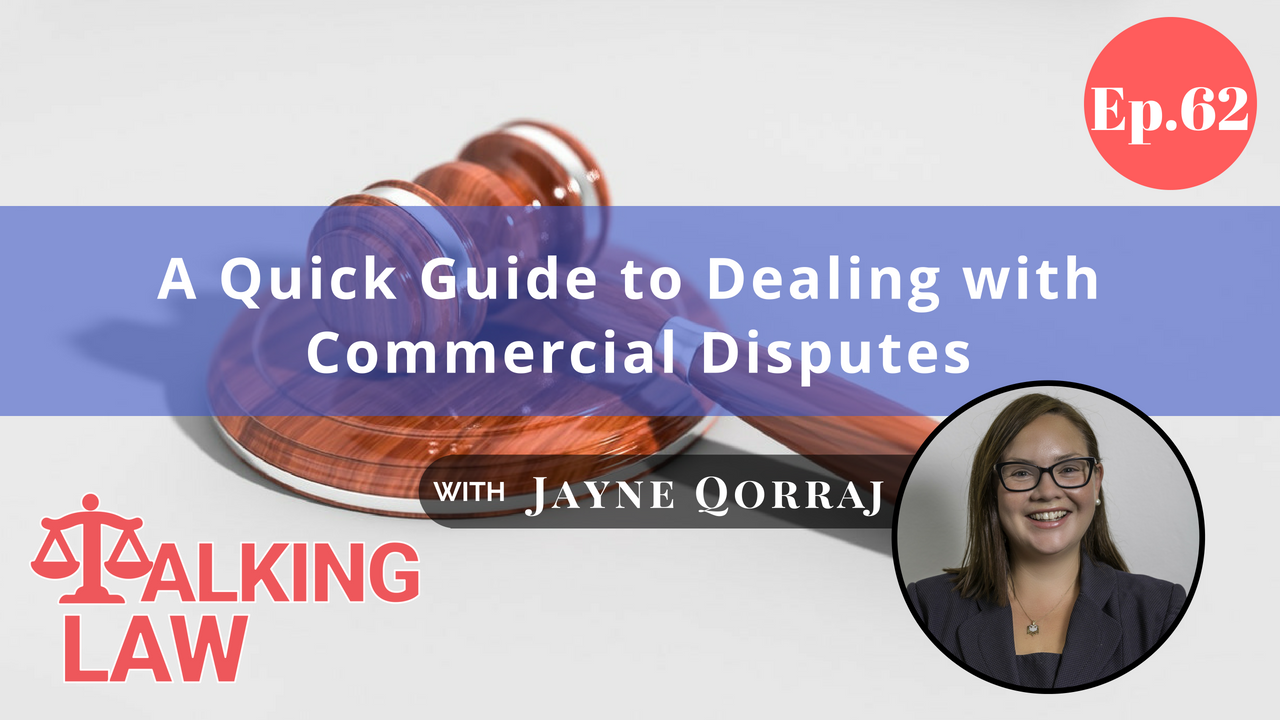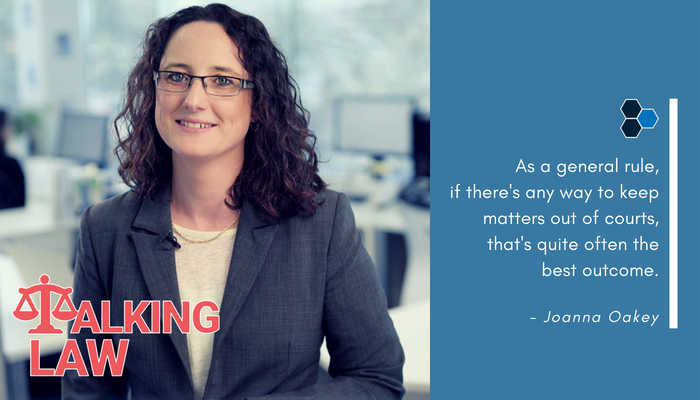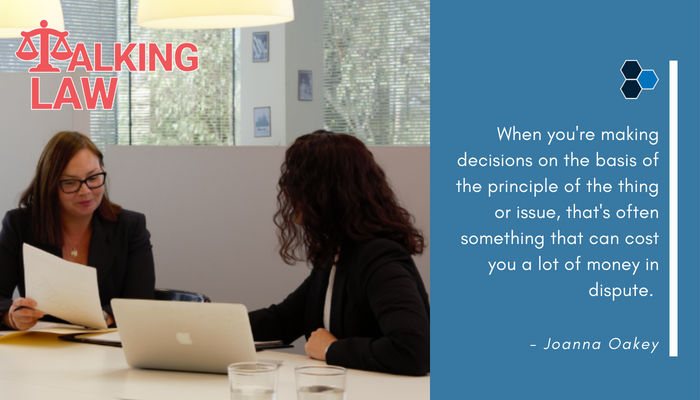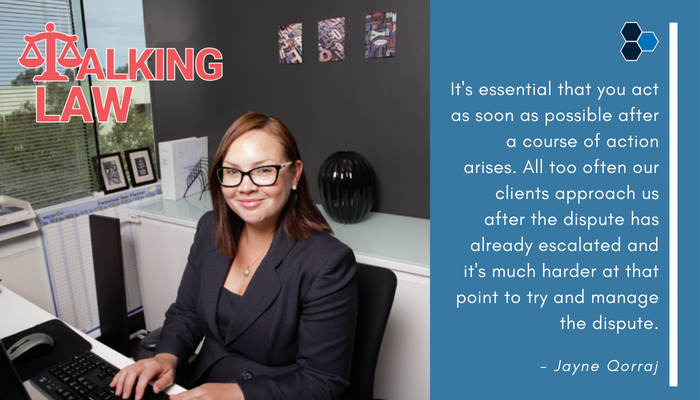
Today we give you our top legal tips for dealing with commercial disputes. To help us with this bold task, we bring back on the show Jayne Qorraj, who heads up our litigation, dispute resolution, and also employment divisions here at Aspect Legal.

Episode Highlights:
- Disputes with employees
- Navigating industry awards
- Bullying and harassment in the workplace
- Outstanding money with customers, clients or suppliers
- Partner or shareholder disputes
- IP and brand protection disputes
- An overview of the dispute process
- Our takeaway tips
Disputes with employees
It can be quite costly and time consuming for businesses in dealing with these disputes. There are a number of common types of disputes that we see quite often. The most common type of dispute we see are disputes with employees. Under this umbrella, the first type of employee dispute is unfair dismissal.
It can be very time consuming and costly type of claim for an employer. Part of that is just because it’s quite easy for an employee, disgruntled employee to bring an action against an employer and then of course they’re forced to deal with it. They have no option other than to put out a defense to the matter. And often we see that they will run right through to a mediation and/or final hearing can really be quite time consuming and costly especially for small business owners.
When you get to the point of termination of a contract, and here we’re talking about employment contracts of course, it’s when the relationship has completely broken down irretrievably. That is the most common point of dispute because there’s no way that you can use personal relationships or you’re far less likely to be able to use commercial outcomes to drive the outcome that you’re after because the relationship is already terminated. This is probably why this is one of the common points of dispute that we see arise again and again, when employees are bringing unfair dismissal actions because they’ve been terminated.

Navigating industry awards
Another area that we see coming up time and time again is difficulty that employers might have with understanding and properly interpreting industry awards. A lot of the awards are quite lengthy and can be quite difficult to navigate so that’s something that we see comes up.
Off the back of that, there can be issues with unpaid statutory entitlements or penalty rates and other types of things that are allowed for in awards that an employer may not even be aware of. Obviously, there can be claims for backpay and other unpaid entitlements which again is something that can be quite time consuming for the employer to have to address.
Bullying and harassment in the workplace
We are seeing an undercurrent there to deal with bullying or harassment in the workplace, specific instances where things have happened at work functions for example.
Employers need to be aware of the anti-bullying stance that they’re required to take and also make sure that they have proper company policies in place, and that their staff have been properly educated in relation to anti bullying and harassment in the workplace.
Outstanding money with customers, clients or suppliers
One of the top areas would definitely be to do with outstanding money. We see that time and time again. It will be a dispute with customers or clients r suppliers or someone claiming that someone else owes them money. At base, that’s where most of our disputes are related to.
But it’s not always about money. Sometimes, and quite often, issues arise because of the very principle of things, not so much always just economic issues. One of the things we say to clients is probably useful talking about here is that principle is costly.
When you’re making decisions on the basis of the principle of the thing or the principle of the issue, you just feel that it’s wrong, that’s often something that can cost you a lot of money in dispute. I think the most important thing is to try and keep emotion out of it.
Partner or shareholder disputes
More often than not it really comes back to the running of the business and obviously one party suggesting or stating that something should be done a certain way and the other not agreeing I guess is the is usually the essence of the dispute.
IP and brand protection disputes
We do come across quite a few brand protection disputes and that obviously involves trade marks, intellectual property. Most recently we had a matter that involved a patent infringement and that actually involved a federal court action.
Sometimes people don’t understand that by importing goods or distributing goods you can become primarily liable for intellectual property infringements as well as the party that supplied you. That’s sometimes where we’ve seen issues occur where parties may not have had any idea that they were in the firing line, where they are simply distributing someone else’s goods or services. They can be liable for intellectual property infringement.
That’s certainly something that we see but probably is quite often joined with the parties who are being attacked not realising that they had this possibility of an infringement action against them.
Often the suppliers are located overseas. It gives them that sort of level of distance where if somebody in Australia is commencing an action then their first target will be the importer and therefore the deemed manufacturer under the legislation. I think that’s something that people need to be aware of.

Our General Commercial Legal Services
Are you looking for a top quality legal team to assist you in your organisation?
Aspect Legal is an innovative commercial legal practice that specialises in providing fast and professional services for their clients. Our commercial legal services cover a wide spectrum of disciplines – contract law, dispute resolution, business sales and acquisitions, brand protection and IP.
We work with clients both large and small, and we’re all about helping you grow while protecting you from the unexpected storms of business. If you’d like to chat about how we might be able to assist you, simply head over to our website at aspectlegal.com.au to book in time for a free discussion with one of our lawyers. So get in touch today!
An overview of the dispute process
As a general overview, the aggrieved party will obviously notify the other party usually in writing. They’ll make some sort of demand in an attempt to obtain what they’re after or at least to start the negotiation process. They will often be some and some back and forth at that point.
If the matter can’t be resolved to the satisfaction of both of the parties, then the aggrieved party will then proceed to file an action by way of a statement of claim or other appropriate action in court. The defendant or respondent if you like, will then have 28 days to file a defense or to satisfy the debt or resolve the dispute.
Failing that, the matter will be listed by the courts for what’s called a pre-trial review, or it does have various names depending on which court you find yourself in, where the parties will find themselves before the court. It’s at that stage that the matter is then given a timetable, directions for things that either party will have to do in order to progress the litigation. You often find that these matters can take anywhere from 6 to 12 months. That would probably be a fairly swift proceeding.
We’ve had matters here that go on for years and years. Once you’re in the court system it’s not necessarily a swift process. That’s important for people to understand as well. Sometimes there’s nothing that you can do about a legal action because an action is commenced against you. And sometimes you need to commence an action against an organisation or a person in order to make them understand that you’re serious.
But as a general rule, if there’s any way to keep matters out of courts, that’s quite often the best outcome.
Even in circumstances where an action has been commenced against you or you’re the party that’s commenced the action, you should really try to continue to negotiate the dispute in an attempt to try and resolve it.
The courts will always encourage the parties to do that on every given opportunity. Every time that the parties are called to court for a matter, they’ll be encouraged to discuss the matter further to try and come to a resolution. So there’s still an opportunity to resolve the matter even when proceedings have commenced and we would always recommend that parties keep that dialogue going in an attempt to resolve it before finding themselves at the point of the final hearing.

Our take away tips
Don’t Delay
Firstly, it’s essential that you act as soon as possible after a course of action arises. All too often our clients approach us after the dispute has already escalated and it’s much harder at that point to try and manage the dispute.
It’s really especially important for employment related disputes that arise out of termination of employment or through the performance management process. A delay will just mean that memories have faded, documents or records might have been misplaced, and it just means that your less likely position to be able to settle the dispute.
One of the issues with delay also is that sometimes people try and manage the dispute themselves. But in doing so, might say far more than they should have and make admissions or make statements that can be harmful to their position in the future. Be really careful about getting help and talking to someone who understands the process of dealing with a dispute from a legal perspective as quickly as possible.
Be realistic
Secondly, be realistic if the negotiations sort of drag on. The extra money that’s spent there obviously reduces the overall amount that you might be likely to recover. Just try and keep the emotion out of it and keep realistic.
Prevention is better than cure
Thirdly, prevention is better and cheaper than the cure, certainly wherever disputes and litigation are concerned.
Disclaimer: The material contained on this website is provided for general information purposes only and does not constitute legal advice. You should not depend upon any information appearing on this website without seeking legal advice. We do not guarantee that the contents of this website will be accurate, complete or up-to-date. Liability limited by a scheme approved under Professional Standards Legislation.














